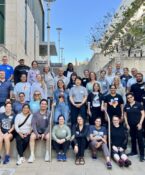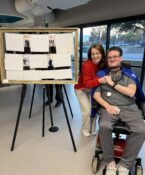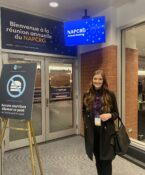College of Pharmacy students go to the zoo
- June 26, 2024
- By: Susan Young
- Community
Have you ever seen how veterinarians give a giraffe eye drops or wondered if human medicines work on animals? That’s what second-year College of Pharmacy students from The University of North Texas Health Science Center at Fort Worth recently learned about when they took a class trip to the Fort Worth Zoo.
The annual field trip is the capstone event for students taking the non-sterile advanced compounding elective which covers compounded medications, unique dosage forms and techniques for both human and animal medications. Should students want to explore veterinarian-related jobs, this gives them a glimpse into a real-world career experience. This is the only course in the College of Pharmacy that directly addresses animal health and pharmacology.
“When Dr. Fix and I had the idea for this course, we decided to focus on advanced compounding techniques that they don’t get in their required curriculum,” said Theresa Day, RCPhT-Adv, PRS, pharmacy skills lab manager, HSC College of Pharmacy. “The first half is dealing with human compounding, and the second half dedicated to veterinary compounding which is a niche field that has grown in the last decade or so. The zoo trip is a culmination of the course.”
Where human and animal pharmacology intersect
Animals need medicines just like humans do but with far more variables and complexities to consider when it comes to dosage amounts and delivery methods. Think frog, elephant and all sizes and species in between.
- For pharmacies that do compounding, there are occasional opportunities to fill prescriptions for veterinary patients.
- Some pharmacy schools offer veterinary pharmacy electives.
- The Society of Veterinary Hospital Pharmacists strongly encourages community pharmacists to develop a strong working relationship with local veterinarians to better care for veterinary patients.
- The S. Bureau of Labor Statistics does not list veterinarian pharmacists as a role but rather includes it in the overall pharmacist category.
- The Texas Department of State Health Services numbers show an estimated 25,000 licensed pharmacists in the state.
Dr. Sarah Cannizzo, associate veterinarian for the Fort Worth Zoo and a board-certified specialist in zoological medicine, spoke to the students about zoo medicines and techniques used to dose different animals and took them on a guided tour of the zoo hospital.
“The more we can educate about medications, the more we can help animals live better, longer lives,” said Cannizzo. “This is important for the animals that I work with. We use a lot of the same products as humans, of course at different dosages and ways of delivery.”
One example Cannizzo gave was primates. Many human medicines work on primates because their physiology is more like humans than other species. When a primate has a disease process that occurs spontaneously as it does in humans, having human medications on hand means more options are readily available to care for them. If the zoo’s regular pharmacy is out of stock, they call in a prescription at the local drug store.
“I once kept receiving refill notifications for one of our animals. They used the animal’s first name and my last name,” Cannizzo laughed.
If one of the zoo’s primates has an eye, gastro or dermatology issue, the zoo vets sometimes consult with human ophthalmologists, gastroenterologists and dermatologists.
“I don’t know if people know how much work and care goes into taking care of animals at the zoo, and how much time we take in thinking about appropriate medicines and what would be most palatable,” said Cannizzo. “It’s not always cut and dry. I work with so many sizes and physiologies. We spend a lot of time and resources and have a large medication budget. It’s good for people to know about. If you could see the stack of prescriptions my team fills, you’d be amazed.
One student’s a-ha moment
“It was enlightening and fun,” said second-year pharmacy student Ashley Ward about her zoo visit experience.
Compounding has always been interesting to Ward and so has the possibility of going into vet medicine. As an undergraduate, she worked with a rehab program for racehorses. At HSC, her first year included the required non-sterile compounding course, and she chose the sterile compounding elective last fall which includes vet compounding.
“It’s important that we learn about animal pharmacotherapy because oftentimes we’re dispensing animal meds,” Ward said. “We can’t counsel on them, but people ask us those questions all the time. With compounding for animals, we have to know [things like] ‘Can this be transdermally delivered? Can we put this in a suspension?’ We have to find ways to only give a milliliter or even less than that because they are just hard to handle. Animals are unpredictable, we love them, but they’re unpredictable.”
Ward’s “aha moment” came when Cannizzo brought up a really important point – there’s not a tried-and-true way of treating every single animal.
“The example she gave was between an African elephant and Asian elephant,” said Ward. “Completely different GI tracs, the difference between how long their small and large intestines are. Absorption is completely different for one than it is for the other.”
Ward said she is “super satisfied” with her education at HSC and the many opportunities to gain experience and get to know her professors. Currently she is an intern at Cook Children’s Medical Center in Fort Worth which she said is making her think she wants to go into clinical.
“I think HSC has a lot of unique opportunities where you have a ton of student organizations, and we just got 95% residency match,” said Ward. “We’re no. 1 in Texas for that. I think that’s wonderful. This most recent class almost got a 100% match rate. So, if you’re interested in clinical or industry, we have all walks of life here.”
This bulleted list is a little different. I kind of feel like it should be introduced. What are these? Facts/figures of what?





Social media